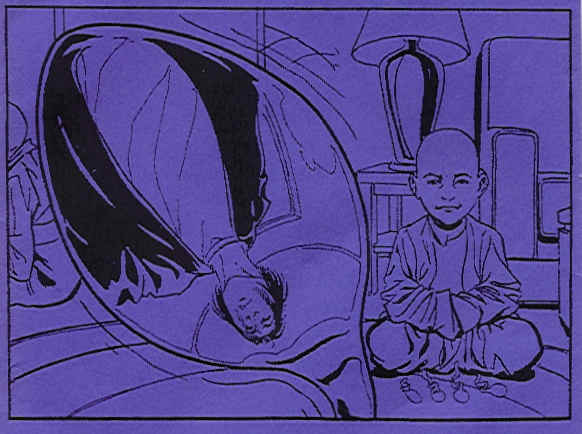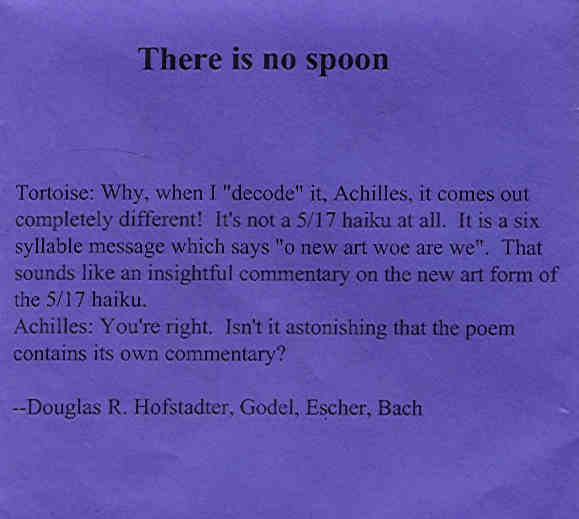Starting with this location we began to receive hand-folded purple envelopes containing clues (or parts of clues, or hints about clues). Each envelope was made of a piece of 8.5" x 11" paper, folded in quarters diagonally and sealed on the back with a paper stamp displaying our team logo.
Throughout the 420 game, we found a number of identical clues at each clue site; each clue was marked with a 1" square sticker for a different team. We were supposed to take only the clue with our team sticker on it.
The advantage of this system is that not only could we tell, by counting the number of envelopes at each clue site when we arrived, how many teams were ahead of us, we could also tell which teams were ahead of us (and which teams were behind us).
The fifth clue consisted of a purple envelope with this drawing on the outside:
and this on the inside:
Also inside the envelope were the following seven pieces of paper:
| It does matter |
| _ _ _ _ _ |
| 3 8 9 |
| Happiness is essential for both the individual and the group. The possibility of ha- |
| ving available all the means to attain it creates a kind of electronic " |
| high", a kind of happiness so evident that it ends up having no more- |
| raison d'etre. There, there is a general problem of critical mass of the means wh- |
| ich puts an end to ends. What happens when everything has been reali- |
| zed in modernity, when everything is virtually given? The question is cr- |
| ucial: where does one go from there? That is the problem: from the moment the subj- |
| ect is perfectly realized, it automatically becomes the objecct, and there is- |
| panic. I am not sure that with the virtual world we are moving closer still to- |
| happiness, because vrituality only gives possibilities virtually, while taking back |
| the reference and the density of things, their meaning. It gives you everything, |
| and subtly, surreptitiously it takes everything away at the same time. It is a- |
| game of which one does not know the rule[s]. One loses what one wins and vice - |
| versa. All that one can do is refuse to play, but it is not easy in our times. |
| Turing's true demise |
| _ _ _ _ _ _ _ _ _ |
| 7 10 18 2 23 |
| One day, Alan Turing woke up at 10am. He was late, and he had to |
| run in a marathon after work. This meant he didn't get home for 9 |
| 3/4 hours. He immediately settled in to read the newspaper he had |
| bought about 95 minutes before he got home. 90 minutes later, he |
| had the idea that would change the world. Sitting at his writing desk |
| for only 5 hours and 15 minutes, he had penned the words that would |
| turn out to be not famous, but prophetic of his own downfall. He |
| then slept easily, and awoke just over 2 hours before he had the |
| previous day, all excited to get to work. In just 90 minutes, he had |
| completed a coded letter that he would send to the masonry society of |
| which he was a member. It explained how to attain true worldly |
| power, by exploiting the power and reasoning abilities of machines. |
| After going on what would be his last bike ride and eating lunch he |
| delivered the letter into the mail a little more than 3 hours before he |
| had gotten home the previous day, thus sealing his fate. Off to work |
| he went, and stayed there for 365 minutes. His letter arrived at its |
| destination early the next morning, a quarter hour before five. It took |
| the masons just 8 hours to decide Turing's fate. He had been outed, |
| and jailed, as the UK was not the place it would become. So, the |
| public might well believe Turing to be in a depressed state. They left |
| word for him to meet them at his house 10 hours later. Although he |
| was suspicious, he had no c hoice but to comply. When they showed |
| up, they overpowered him, and kept him tied up for just over 11 |
| hours while they prepared his house. Finally, they killed him. He was |
| found just under 7 hours later, by his maid, who announced to the |
| world that Alan Turing had committed suicide. |
| All roads lead to Rome |
| _ _ _ _ _ _ _ _ _ _ _ |
|
12 26 17 25 |
| VJGTG |
| KUPQU |
| RQQPZ |
| From unconnected bitter ancient robot: |
| _ _ _ _ _ _ _ |
|
14 24 19 |
| HOT ION RESPONSE |
| It's pretty clear. |
| _ _ _ _ _ _ _ _ _ _ |
|
27 13
21 6 11 |
|
|
|
Am
I real, or am I Memorex?
|
|
_
_ _
_ _ _ _ _ _
|
|
5 20,1
16 |
|
Thomas
Jefferson
|
|
Sam
Spade, Huckleberry Finn, Alex Delaware, James Bond
|
|
Hiro
Protagonist
|
|
Michael
Valentine Smith, Neal Stephenson, Don Quixote
|
|
Philiip
Marlowe
|
|
Emma
Bovary, Chia Pao-yu
|
|
Victoria
Warshawski, Martin Quirk, Jubal Harshaw
|
|
Charlie
Chaplin, Jean Valjean
|
|
Gauguin,
Malcolm X, Warhol
|
|
Phoebe
Buffet, Colonel Aureliano Buendia, Holden Caulfield
|
|
Willy
Loman, Ulysses S. Grant, Michael Jordan, Jane Eyre
|
|
Saul
Bellow, MC Escher, Walt Whitman
|
|
Maxfield
Parrish, Harold Pinter, Edgar Rice Burroughs
|
|
William
Gibson, Genji
|
| Execution matters |
| _ _ _ _ _ _ |
|
4 15 |
| GiVen This ArT, WhiCh OnE WilL? |
| IdeAS WON't KILL, |
| ImaGE Seems LESS EVIL THEn. |

